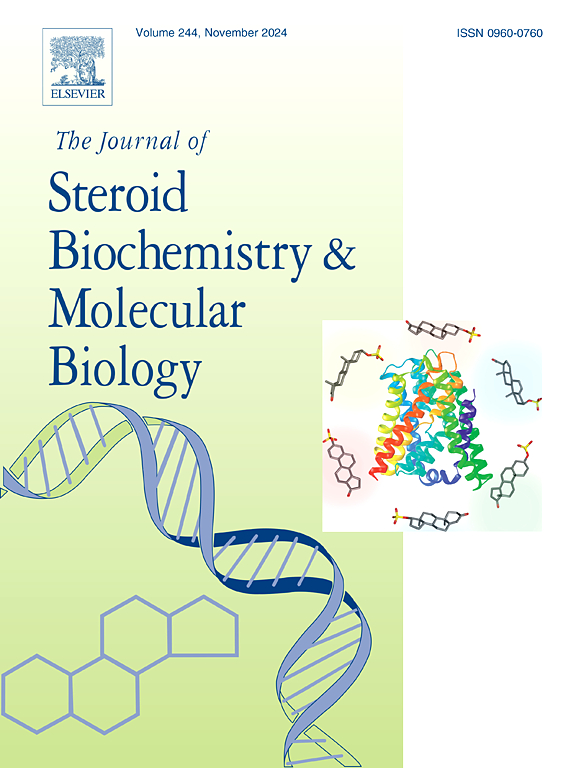PM暴露对睾酮生物合成和精子发生的破坏:苦味转导的隐藏作用
IF 2.7
2区 生物学
Q3 BIOCHEMISTRY & MOLECULAR BIOLOGY
Journal of Steroid Biochemistry and Molecular Biology
Pub Date : 2024-12-28
DOI:10.1016/j.jsbmb.2024.106670
引用次数: 0
摘要
男性不育是全球主要的生殖健康问题,与空气微粒污染和炎症反应增加有关。苦味转导,涉及感知苦味,炎症和免疫调节,在男性生殖损伤中仍未得到充分研究。本研究探讨了颗粒物(PM)对男性生殖健康的影响以及苦味转导在生殖毒性中的作用。采用卵清蛋白(OVA)腹腔注射后雾化吸入法建立PM暴露小鼠模型。结果显示,PM暴露导致精子数量减少,精子畸形率升高,精管上皮高度和直径降低,生精细胞排列紊乱,约翰森评分降低,提示睾丸结构损伤和生精障碍。此外,PM暴露降低了血清睾酮水平,并降低了参与睾酮合成、转运和精子发生的基因mRNA表达,包括黄体生成素受体(LHR)、类固醇急性调节蛋白(StAR)、细胞色素P450侧链切割酶(P450scc)、17- β-羟基类固醇脱氢酶(17β-HSD)、雄激素结合蛋白(ABP)和DEAD-box解旋酶3y -linked (Ddx3y)。pm暴露小鼠睾丸中促炎细胞因子基因TNF-α和炎症基因IL-4Rα、JAK1、JAK2、JAK3、STAT3、STAT6均显著上调。同时,Th1细胞因子基因IFN-γ的表达受到抑制,Th2细胞因子基因IL-4、IL-5和IL-13的表达增强。在pm处理的小鼠睾丸中,35个苦味受体(T2R)基因中的24个及其下游信号分子α-gustducin和瞬时受体电位阳离子通道亚家族M成员5 (TRPM5)基因表现出转录抑制。苦味化合物黄芩苷可减轻pm诱导的男性生殖损伤,同时激活睾丸特异性T2R簇(T2R102、T2R109、T2R113、T2R117、T2R119、T2R124、T2R135、T2R136)、α-gustducin和Trpm5。综上所述,PM吸入影响睾酮生物合成和精子发生,引起炎症反应和免疫失衡,导致睾丸损伤,这些都与苦味传导的抑制有关。结果表明,苦味信号分子可以作为预防和治疗男性不育症的潜在靶点。本文章由计算机程序翻译,如有差异,请以英文原文为准。
Testosterone biosynthesis and spermatogenesis disruption by PM exposure: The hidden role of bitter taste transduction
Male infertility, a major global reproductive health concern, has been linked to increased particulate air pollution and inflammatory response. Bitter taste transduction, involved in sensing bitterness, inflammation, and immune regulation, remains understudied in male reproductive damage. This research investigated how particulate matter (PM) impacts male reproductive health and the involvement of bitter taste transduction in reproductive toxicity. A PM exposure mouse model was established via aerosol inhalation of ovalbumin (OVA) following intraperitoneal injection of OVA. Results showed that PM exposure reduced sperm count, increased sperm malformation rate, decreased seminiferous epithelium height and tubular diameter, and caused disordered spermatogenic cell arrangement, along with decreased Johnsen scores, suggesting testicular structural damage and spermatogenesis disorders. Furthermore, PM exposure reduced serum testosterone levels and diminished the mRNA expression of genes involved in testosterone synthesis, transport, and spermatogenesis, including luteinizing hormone receptor (LHR), steroidogenic acute regulatory protein (StAR), cytochrome P450 side-chain cleavage enzyme (P450scc), 17-beta-hydroxysteroid dehydrogenase (17β-HSD), androgen-binding protein (ABP), and DEAD-box helicase 3 Y-linked (Ddx3y). Meanwhile, pro-inflammatory cytokine gene TNF-α and inflammatory genes IL-4Rα, JAK1, JAK2, JAK3, STAT3, and STAT6 were significantly upregulated in testes of PM-exposed mice. This was accompanied by inhibited expression of Th1 cytokine gene IFN-γ and enhanced expression of Th2 cytokine genes IL-4, IL-5, and IL-13. Twenty-four out of thirty-five bitter taste receptor (T2R) genes, along with their downstream signaling molecules α-gustducin and transient receptor potential cation channel subfamily M member 5 (TRPM5) genes exhibited transcriptional repression in testes of PM-treated mice. The bitter compound baicalin alleviated PM-induced male reproductive damage accompanied with activating testis-specific T2R cluster (T2R102, T2R109, T2R113, T2R117, T2R119, T2R124, T2R135, T2R136), α-gustducin and Trpm5. In conclusion, PM inhalation affects testosterone biosynthesis and spermatogenesis, induces inflammatory response and immune imbalance, and causes testicular injury, all of which are associated with the inhibition of bitter taste transduction. The results indicate that bitter signaling molecules could serve as potential targets for preventing and managing infertility in men.
求助全文
通过发布文献求助,成功后即可免费获取论文全文。
去求助
来源期刊
CiteScore
8.60
自引率
2.40%
发文量
113
审稿时长
46 days
期刊介绍:
The Journal of Steroid Biochemistry and Molecular Biology is devoted to new experimental and theoretical developments in areas related to steroids including vitamin D, lipids and their metabolomics. The Journal publishes a variety of contributions, including original articles, general and focused reviews, and rapid communications (brief articles of particular interest and clear novelty). Selected cutting-edge topics will be addressed in Special Issues managed by Guest Editors. Special Issues will contain both commissioned reviews and original research papers to provide comprehensive coverage of specific topics, and all submissions will undergo rigorous peer-review prior to publication.

 求助内容:
求助内容: 应助结果提醒方式:
应助结果提醒方式:


